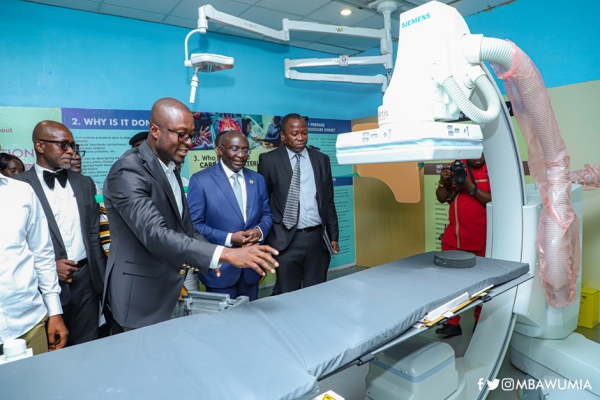The Vice President, Dr Mahamudu Bawumia, has challenged hospitals and other medical facilities across the country to partner with the private sector to provide and maintain essential equipment in order to help the facilities offer top-notch care to patients.
Dr Bawumia, who made the call in Accra on Tuesday, 25 April 2023 said although government continues to invest heavily in the health sector, with unprecedented recruitment of health personnel, the provision of infrastructure such as the Agenda 111 projects, and the introduction of medical drone delivery services, the cost of providing some cutting edge equipment cannot always be borne by government, and it is therefore imperative that hospital managements explore other options.
The Vice President called for this partnership when he commissioned a Catherization Laboratory at the nation’s premier health facility, the Korle Bu Teaching Hospital. The one million dollar ($1m) lab, the most advanced Cath Lab in the country, and its accompanying Big Detector, dyna CT and roadmap software and 3D workstation – essential for the requirements for achieving accurate and effective minimally invasive treatments – was procured and funded by the Bank of Ghana as part of its Corporate Social Responsibility.
According to officials of the Korle Bu Teaching Hospital, Ghana is currently the only country in the West Africa subregion offering advanced minimally invasive endovascular treatments (performing brain surgeries without cutting the skull) for conditions such as brain aneurysms, and the acquisition of this Lab is expected to reduce the incidence of patients being referred abroad for further tests and treatments.
Underscoring the importance of advanced, modern equipment in the delivery of quality healthcare, Vice President Bawumia acknowledged Government’s difficulty in solely meeting all the demands of the hundreds of health facilities across the country, and challenged the management of such facilities to be proactive and engage all stakeholders.
“A Catherization Lab is a valuable asset for any country, and a good addition to the overall healthcare infrastructure of Ghana. By investing in such advanced medical facilities, Ghana can attract and retain skilled medical professionals, improve the training of local doctors and enhance the quality of care provided to patients…
“I should note that the need for critical medical equipment is huge across all our hospitals. However, we don’t have many Bank of Ghanas around to finance the procurement of all the needed equipment. It is therefore important that going forward, hospitals should consider partnering with the private sector who would be willing to provide and maintain such equipment for a service fee in the context of a private-public partnership.
“I believe that with the right policies Ghana can have a first class health delivery system. It is possible” he declared.

